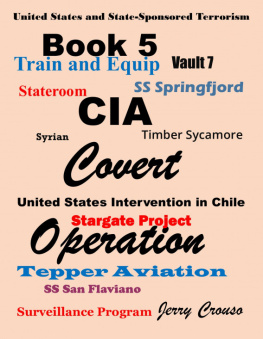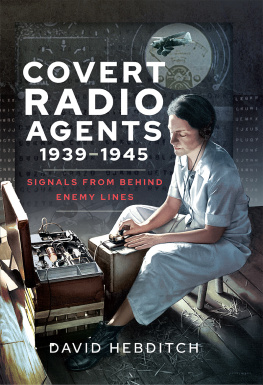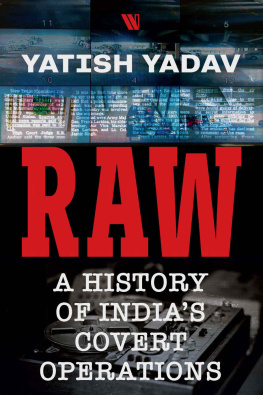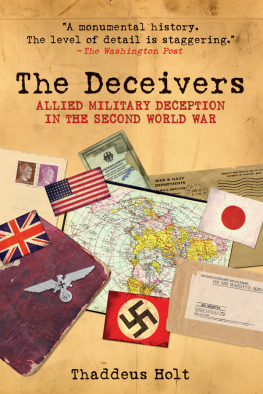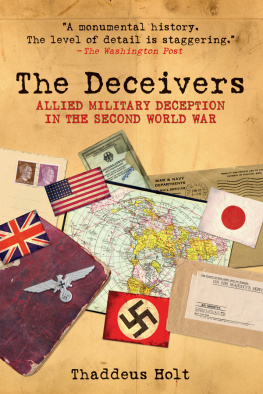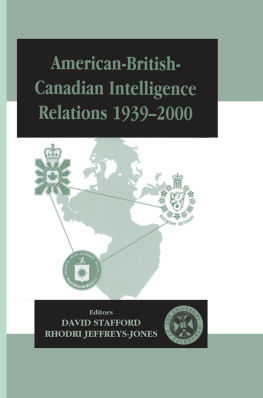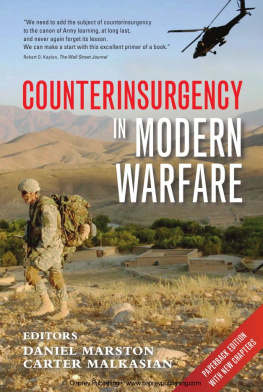Thomas E. Mahl - Desperate Deception - British Covert Operations in the United States, 1939-44
Here you can read online Thomas E. Mahl - Desperate Deception - British Covert Operations in the United States, 1939-44 full text of the book (entire story) in english for free. Download pdf and epub, get meaning, cover and reviews about this ebook. year: 2000, publisher: University of North Carolina Press, genre: History. Description of the work, (preface) as well as reviews are available. Best literature library LitArk.com created for fans of good reading and offers a wide selection of genres:
Romance novel
Science fiction
Adventure
Detective
Science
History
Home and family
Prose
Art
Politics
Computer
Non-fiction
Religion
Business
Children
Humor
Choose a favorite category and find really read worthwhile books. Enjoy immersion in the world of imagination, feel the emotions of the characters or learn something new for yourself, make an fascinating discovery.

- Book:Desperate Deception - British Covert Operations in the United States, 1939-44
- Author:
- Publisher:University of North Carolina Press
- Genre:
- Year:2000
- Rating:5 / 5
- Favourites:Add to favourites
- Your mark:
- 100
- 1
- 2
- 3
- 4
- 5
Desperate Deception - British Covert Operations in the United States, 1939-44: summary, description and annotation
We offer to read an annotation, description, summary or preface (depends on what the author of the book "Desperate Deception - British Covert Operations in the United States, 1939-44" wrote himself). If you haven't found the necessary information about the book — write in the comments, we will try to find it.
Thomas E. Mahl: author's other books
Who wrote Desperate Deception - British Covert Operations in the United States, 1939-44? Find out the surname, the name of the author of the book and a list of all author's works by series.
Desperate Deception - British Covert Operations in the United States, 1939-44 — read online for free the complete book (whole text) full work
Below is the text of the book, divided by pages. System saving the place of the last page read, allows you to conveniently read the book "Desperate Deception - British Covert Operations in the United States, 1939-44" online for free, without having to search again every time where you left off. Put a bookmark, and you can go to the page where you finished reading at any time.
Font size:
Interval:
Bookmark:
British Covert Operations in the United States, 193944
Thomas E. Mahl

Copyright 1998 Potomac Books, Inc.
First paperback edition 1999
Published in the United States by Potomac Books, Inc. All rights reserved. No part of this book may be reproduced in any manner whatsoever without written permission from the publisher, except in the case of brief quotations embodied in critical articles and reviews.
Library of Congress Cataloging-in-Publication Data
Mahl, Thomas E., 1943
Desperate deception : British covert operations in the United States, 193944 / Thomas E. Mahl1st ed.
p. cm.
Includes bibliographical references and index.
1. World War, 19391945Secret serviceGreat Britain. 2. World War, 19391945Secret serviceUnited States. I. Title.
D810.S7M254 1998
940.548641dc21 97-19550
CIP
ISBN 978-1-57488-080-9 (hardcover)
Designed by Page Graphics, Inc.
Printed in Canada on acid-free paper that meets the American National Standards Institute Z39-48 Standard.
Available from:
Potomac Books, Inc.
22841 Quicksilver Drive
Dulles, Virginia 20166
800775-2518
First Edition
10 9 8 7 6 5 4 3 2 1
To Ben and Mary Ternes Mahl,
my grandparents
Brasseys Intelligence and National Security Library is intended to provide citizens, students, scholars, and national security experts with a select set of books that make a unique or significant contribution to understanding the world of intelligence.
The intelligence literature contains much discussion but few studies of covert actionthe secret influencing of events in other countries without revealing ones involvement. Much of the focus has been on sensational paramilitary activities, and most of this has been about failures. There has been little detailed study of other aspects of covert action.
Desperate Deception helps fill the gap. It is a very readable account of British covert action in the United States in the years just before and during World War II. Faced with the growing prospect of war with Germany, the British government mounted in 1939 a massive secret political campaign in the United States (including the use of front groups, agents, collaborators, manipulation of polling data, involvement in election campaigns, etc.) to weaken the isolationists, bring the United States into the war, and influence U.S. war policy in Englands favor. This campaign helped change not only the course of World War II but also the face of American politics in succeeding decades.
While bits and pieces of the story have been told before and some of the details of the British campaign are lost to history, this is probably the best-researched and best-documented account we are likely to see on this crucial period of Western history. It is also a well-written story that combines both journalistic and academic skills. Desperate Deception is a milestone book on covert action and intelligence.
Roy Godson
General Editor
Brasseys Intelligence and National Security Library
What youre looking for, what Ive looked for, is the file with the whole story in it. That file doesnt exist, retired CIA historian Thomas F. Troy told me when I began my research on this book. The material you want has been scattered to the windsa sentence here, a paragraph there. Youll have to hunt them out just as Ive had to. This wild scattering is only one of the problems that confront scholars who attempt to explore the covert operations of intelligence agencies as they indistinctly reveal themselves in the public events of diplomatic and domestic history.
As Yale historian Robin Winks has written, There is, in fact, very little careful, solid research on the...intelligence community...even though intelligence history is an essential component of our times. Intelligence is truly the missing dimension, not only of diplomatic history, but of the domestic history dealt with in this book. A consequence of this void has been elementary errors that appear in academic histories. One better-informed study notes: The distinguished editor of a major volume of military diaries published in 1972 failed to realize that the references to C and Cs information referred to the head of the Secret Intelligence Service.
British historian Ronald Lewin pointed out in his essay A Signal-Intelligence War that strict official secrecy has caused most of the significant volumes in the United Kingdom series of Official Histories of the Second World War [to be] fundamentally misleading, inadequate and out-of-date. Lewin points to the ruses used to camouflage the Normandy invasion which tied down the German 15th Army.
What Lewin and others have written about the secrecy surrounding code-breaking and signals intelligence is even more relevant to this books topic: the covert action and dirty tricks used to move the United States toward war and destroy isolationism as a respectable intellectual position.
Several research problems confront the intelligence research scholar. First, many of the particulars were never put on paper. Among his many tasks, lawyer Ernest Cuneo (code name CRUSADER) was liaison between British Security Coordination and several departments of the U.S. government. Here he is writing to Dick Ellis, who had been second-in-command for British intelligence operations in the Western Hemisphere during World War II: I saw Berle at State, Eddie Tamm, J. Edgar and more often the Attorney General; on various other matters Dave Niles at the White House and Ed Foley at the Treasury, but so far as I know [there] wasnt a sentence recorded. I reported to Bill Donovan and George Borden [Bowden], and never in writing.
Even those within the intelligence agencies have sometimes lacked a clear understanding of how events proceeded; it sometimes appears that the insiders only advantage over the outsider has been the insiders knowledge that he did not know. In a recently declassified 1968 book review of Ladislas Faragos The Broken Seal: The Story of Operation Magic and the Pearl Harbor Disaster, CIA reviewer Edwin C. Fishel wrote of Pearl Harbor: It is becoming increasingly clear that if we want a straight story...and that is surely a reasonable wantit is going to have to be produced by professionals. This is true not only because of the unlikelihood of getting an adequate outside study but also because a really complete study involves information still classified. Much of it does not even exist on paper.
Much of that information which is on paper and stored in a rational, readily retrievable way remains classified. In Great Britain the Official Secrets Act was first passed in 1911 under fear of Irish and German subversion; it was tightened as recently as the 1980s and acts as a powerful inhibition against research. The British government has an arbitrary right to withhold any document it wishes, the thirty-year rule for release notwithstanding. Harford Montgomery Hyde worked for British intelligence in New York and later wrote about its personnel and operations. After his death in 1989 the British government closed many of his papers at Churchill College, Cambridge, until 2041. Fortunately several scholars, Canadian historian David Stafford and Timothy Naftali of Harvard being two, had scrutinized these papers before the veil fell.
In the United States the Freedom of Information Act would appear on the surface to be a solution to the problem of hidden documents, but in reality it is of limited usefulness. Firstly, there is what author James Bamford has called quite likely the most secret agreement ever entered into by the English-speaking world, the 1947 UKUSA agreement between the United States and Britain prohibiting the United States from releasing any document that the British will not allow released. In effect the Official Secrets Act operates in the United States for some of the embarrassing information covered by this book.
Font size:
Interval:
Bookmark:
Similar books «Desperate Deception - British Covert Operations in the United States, 1939-44»
Look at similar books to Desperate Deception - British Covert Operations in the United States, 1939-44. We have selected literature similar in name and meaning in the hope of providing readers with more options to find new, interesting, not yet read works.
Discussion, reviews of the book Desperate Deception - British Covert Operations in the United States, 1939-44 and just readers' own opinions. Leave your comments, write what you think about the work, its meaning or the main characters. Specify what exactly you liked and what you didn't like, and why you think so.


